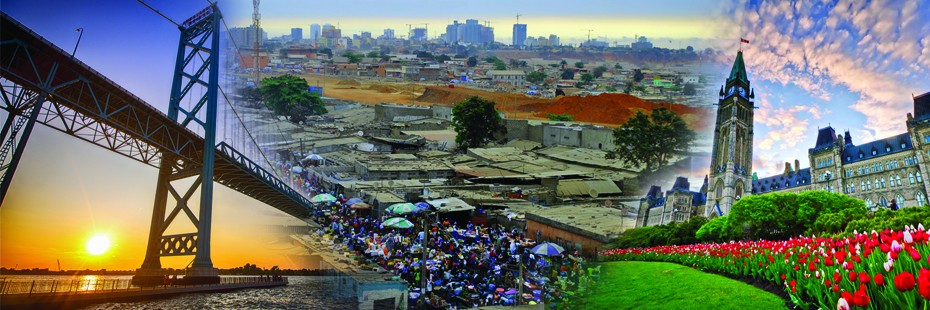Join Us on October 20, 2023 from 10:00am to 11:30am in room 1137 at the Chrysler Hall North Building on campus


The Department of Political Science is looking for senior Political Science students interested in becoming student mentors
Student mentors will enrol in GART-4000/SOSC-4000 Mentorship and Learning and will work as mentors to first-year students in POLS-1000 Introduction to Canadian Government and Politics in the Fall 2023 semester. This is a great opportunity to gain teaching experience to put on your resume, get a senior course credit, and to make important connections with other students in your program.
QUALIFICATIONS: Semester 5-8 (3rd or 4th year) status in a Political Science program (Political Science; International Relations; Law and Politics; French Specialization)
Note: Semester status in Fall 2023.
Major GPA: 77 GPA average or higher
REQUIREMENTS: One-page application letter and Unofficial transcript
DEADLINE: Friday March 31st 4:30 pm
Please submit your application in one document to polsci@uwindsor.ca

The Center For American Studies invites you to participate in the 4th edition of the International Summer School in the Foundations of Democracy: American Law, Politics & Economy!
During Summer School in the Foundations of Democracy: American Law, Politics & Economy you will gain knowledge across fields such as law, politics, economics, international relations, sociology, and philosophy. You will also develop your critical thinking, teamwork, and argumentation skills.
Participants are not required to have advanced knowledge of law, politics or economics in order to participate. The Summer School is intended to be an educational program that popularizes knowledge about democracy and American law, politics & economy among participants from all over the world.
All classes are led by world-class faculty from the best European and American universities (alumni of universities such as Harvard, Oxford, Princeton, Virginia, and George Mason University).
The Summer School takes place live in Rome, Italy, on July 16-30, 2023. Registration with a discount is available only until April 1, 2023!
More information about the registration process: www.cfasofficial.com/en/summerschool
Fall 2023 Exchange Applications

ORIENTATION WINTER & ANTI-RACISM WORKSHOP 2023
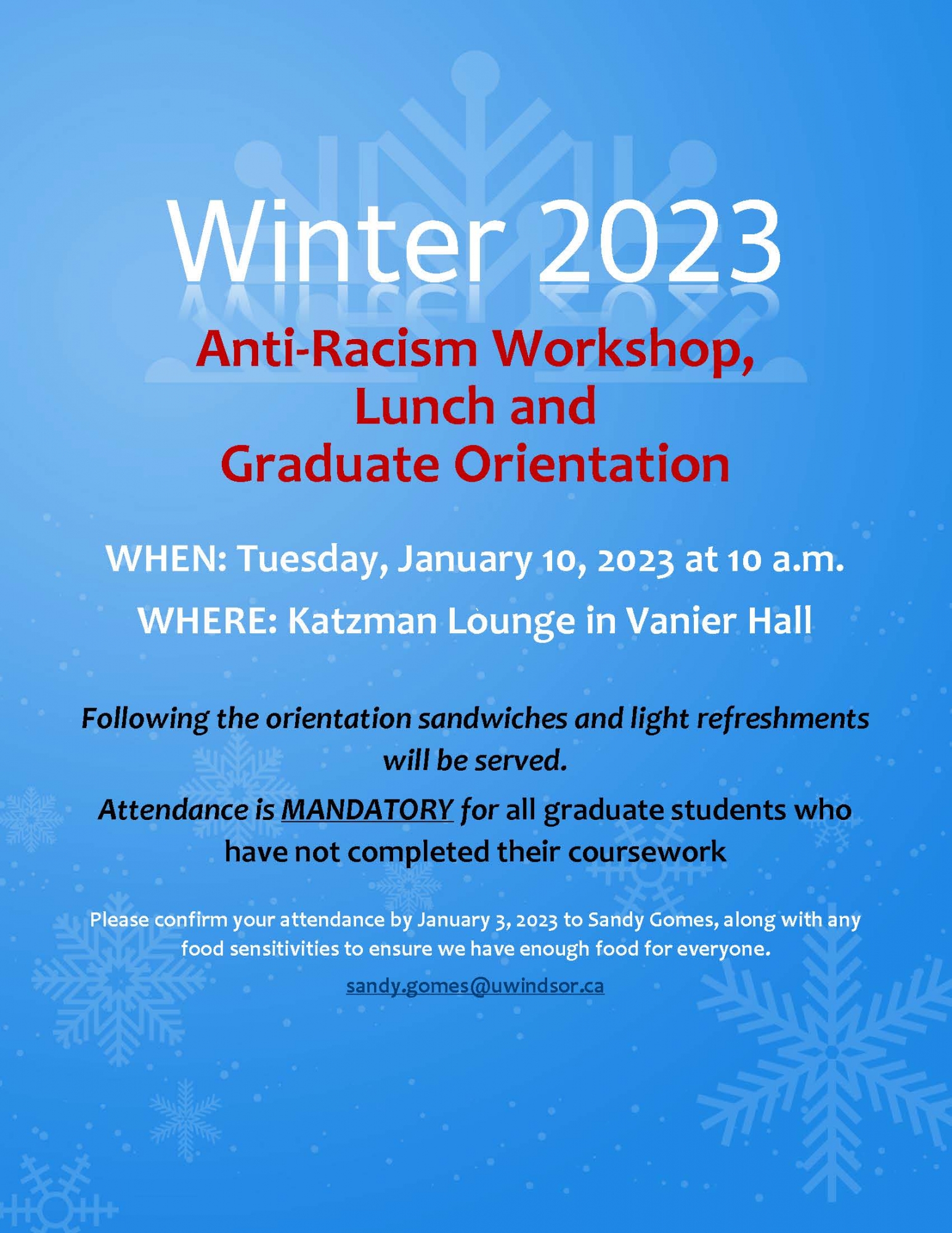
Upcoming WECAP
The next student information session for WECAP is January 13th, 2023 at 1pm. Students graduating in Fall22 and Winter23 are eligible. Please contact Avy Maharaj (she/her) Career Advisor @ amaharaj@uwindsor.ca in the Windsor Career Development & Experiential Learning Department for further information.

Marie Heinen - LIVE
Marie Heinen will be visiting campus on Tuesday, November 29th @ 12:00pm in the Education Building, Room 1101.
In her new book Nothing But the Truth; a Memoir, Marie Heinen shares her unvarnished view on the ethical and practical implications of being a criminal lawyer, and how the job is misunderstood and even demonized.
This is a rare opportunity to hear from one of Canada’s top litigators. Please be sure to attend.

FIRESIDE CHAT - Neil Buhne
Join Us for a Fireside Chat with Neil Buhne this Friday November 25 from 12-1pm at the Odette Building in room 108.
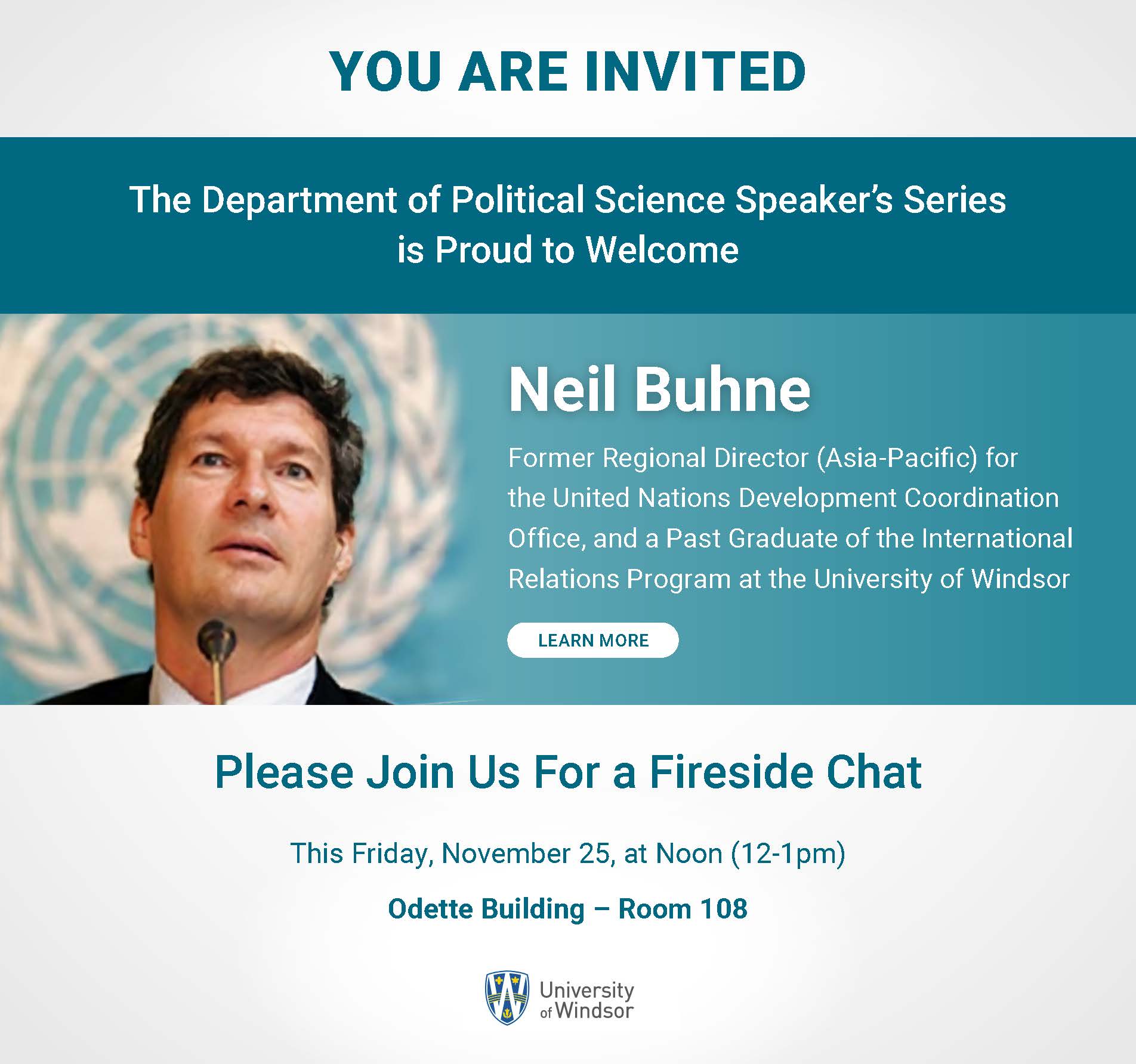
POLITICAL SCIENCE LEAD SCHOLARS - 2022
Congratulations to the following Recipients of the Lead Medallion Award:
(GEM & GOLD)
Alyssa Haskell - Photo
ADDITIONAL GOLD LEAD SCHOLARS
Jeremiah Bowers - Photo
Michael Critchley - Photo
Alyssa Harris
Nicholas Kinnish
Sana Syed
SILVER LEAD SCHOLARS
Sarah Alghizi
Adrianna Isshak - Photo
Oketa Satri
BRONZE LEAD SCHOLARS
Aleks Draca - Photo
Leddy Library invites the community to join a conversation around climate justice to celebrate International Open Access Week.
International Open Access Week is a global, community-driven week of action to open access to research. The event is celebrated by individuals, institutions, and organizations across the world.
This year’s theme focuses on climate justice and seeks to encourage connection and collaboration among the climate movement and the international open access community. The library has invited climate scholars Allison Gray and Jamey Essex to share perspectives on the topic during a one-hour lecture Friday.
“Access to knowledge is a human right, and we recognize that some populations face barriers when seeking knowledge on topics such as climate change,” said scholarly communications librarian Pascal Calarco. “Understanding the climate crisis requires the free exchange of knowledge across geographic, economic, and disciplinary boundaries and Open Access initiatives can help mitigate this issue.”
The conversation will take place Friday, Oct. 28 from 1 to 2 p.m. in the library’s Student Research Collaboratory and will also be offered online for folks to join in around the world.
The Leddy Library supports numerous open access initiatives to make resources more accessible to readers such as hosting of scholarly journals, including openly licensed ones, and providing software, support for academic journals, monographs, and conferences.
The Leddy Library invites clients to learn more by exploring its Open Access Climate Justice research guide and attending the free Open Access Week lecture, “A Conversation Around Climate Justice”
Visit the Leddy Library’s website to learn more.
Andrew Richter: Putin's cavalier attitude towards nuclear force is a danger to us all
Special to National Post
Publishing date: Oct 12, 2022

Sixty years ago this month, the world held its collective breath as the United States and the Soviet Union came close to using nuclear weapons. The crisis began with Soviet Premier Nikita Khrushchev believing that he could literally sneak nuclear weapons into Cuba, and ended when the Soviet leader realized that U.S. President John F. Kennedy was not going to back down, and his brazen act might trigger a Third World War.
In the intervening decades, the world has faced several additional nuclear crises — including a particularly dangerous one during the 1973 Yom Kippur War, when U.S. forces went on heightened alert at a time when President Richard Nixon was totally preoccupied with Watergate — but thankfully such episodes have grown less frequent in the post-Cold War era.
How quickly things change. More than six months after Russian forces invaded Ukraine in an attack that was badly planned, badly executed and badly flawed, the international community finds itself in a place that was scarcely imaginable in February: Russian forces are facing defeat on the battlefield, and with President Vladimir Putin confronting a growing domestic crisis at home, Moscow is issuing nuclear threats almost daily.
Thus, the key questions are “how seriously should we take these threats,” and “is Russia desperate enough that it would actually use nuclear weapons?”
With regard to the first question, observers need to understand the bleak situation that Putin finds himself in. Believing that Ukraine would quickly fall (and his forces being greeted as liberators), Putin began the war convinced that it would all go according to plan, and Russian soldiers would be home by spring. But within weeks, it was clear just how terribly flawed his thinking was.
The Russian military has, once again, proven itself to largely be a paper tiger. Despite seemingly impressive forces, in reality, the Russian military is lacking in training, equipment and leadership. As for Ukraine, few observers appreciated how dramatically its forces had improved over the past decade (with enormous assistance from NATO), and how committed its troops are to defending their homeland.
The result has been a total disaster for Russia — in many ways, far worse than the Afghanistan debacle of 40 years ago. At least in that war, Soviet commanders were secure in the knowledge that no matter how bad things went, once the decision was made to withdraw, the war would end.
The situation in Ukraine is different, and with Russian forces now on the defensive, it is unclear to what extent Moscow controls the strategic environment. Indeed, having been repeatedly routed over the past few weeks, Russia’s forces are now in disarray and possibly on the verge of collapse. That was the reason for Putin’s desperate partial mobilization order, even though it has almost no chance of changing the reality on the ground.
And to all of this we must add one final consideration: if Russia were to be defeated, Putin would face a very uncertain personal future. While there is literally no possibility that he will stand trial for his crimes at the International Criminal Court in The Hague, it is very likely that he would be deposed and how he would be dealt with by his successor is anyone’s guess. Virtually every conceivable scenario is possible.
This, then, forms the backdrop to Putin’s threats. In essence, he may now view nuclear weapons as a kind of battlefield “equalizer” — weapons that hold the potential to change the equation from one of hopelessness to one of fear, uncertainty and unpredictability. He might even think that using such weapons is preferable to defeat.
Any use of nuclear weapons by Russia would obviously have enormous consequences, and it is virtually certain that the West would respond, even though Ukraine is not a member of NATO and thus its members would be under no obligation to defend it.
While it’s unlikely that NATO would respond with nuclear weapons in kind, the alliance would likely respond forcefully by striking high-value Russian targets. It would then be up to Moscow to decide whether to go up the “escalation ladder” (a phrase coined in 1962 by the American nuclear strategist Herman Kahn), or to allow the situation to cool somewhat and hopefully end in some sort of negotiated settlement.
Putin is hardly the first autocrat who has found that his most trusted advisors are precisely the people who are most likely to lie to him. Believing that they would be fired (or worse) if they tell their boss something he does not want to hear, they have instead fed him a steady diet of impossibly rosy forecasts, imaginatively inaccurate scenarios and entirely misleading intelligence. Those lies, combined with Putin’s hubris, have led Russia to the verge of defeat and humiliation.
All of which suggests that we are entering a period of profound global uncertainty and risk. Russia has long been a puzzle to the West (“a riddle, wrapped in a mystery, inside an enigma,” as Winston Churchill famously put it), and its foreign policy choices have often appeared irrational and provocative. The present situation is no different, only this time it is cavalierly issuing threats that could result in a nuclear catastrophe.
National Post
Andrew Richter is an associate professor of political science at the University of Windsor. The Post’s New World Disorder series explores the recent shifts in geopolitics and what must be done to adapt.
Yashpreet Birdi, a Master of Arts student within the Department of Political Science has been awarded “Best Entry” for Faculty of Arts, Humanities, and Social Sciences (FAHSS) faculty in the uWindsor’s 2nd Annual Twitter-based Graduate Showcase Contest.
Yashpreet is currently conducting research as part of her Major Research Paper under the supervision of Dr. Rebecca Major titled “Dalit Studies: The Impacts of British Colonization in India, Dalit Identity, & The Internationalization of Caste-Based Discrimination At The United Nations”. This research is exploring the social exclusion and identity of Dalits, a scheduled caste group in India, and the role of the United Nations Organization in addressing casteism.
Check out Yashpreet’s submission to the uWindsor Twitter showcase of her grad research here https://twitter.com/YashpreetBirdi/status/1526943765872664577?s=20&t=WskxcmvdN0EXrSd5sOqAhA
Andrew Richter: Russia's attack on Ukraine an unmistakeable reminder of Moscow's true face
Special to National Post
Publishing date: Mar 03, 2022

A picture shows damages in a building entrance after the shelling by Russian forces of Constitution Square in Kharkiv, Ukraine's second-biggest city, on March 2, 2022. (Photo by Sergey BOBOK / AFP)
For those who take a long-term view of Russian foreign and defence policy, the attack on Ukraine came as no surprise. Indeed, the bigger surprise was witnessing the genuine shock and incredulity of many observers, for whom the idea of Russia invading its neighbour had become largely unthinkable despite the fact that this has happened repeatedly in the recent past.
In the past quarter century alone, Russian forces have attacked former Soviet republics five times — Chechnya (twice), Georgia, Crimea, and now Ukraine — a rate that surpasses the frequency of the use of Soviet forces during the Cold War. In point of fact, Russia is easily the world’s most frequent user of large-scale military force, a title that many Western commentators (and Russian apologists) have a hard time comprehending.
These endless conflicts raise the perpetual question; what does Russia want, and can it be satisfied? I believe the answer is clear enough, although it’s a difficult one to accept.
When President Vladimir Putin said in 2005 that the break-up of the Soviet Union was the greatest geo-political catastrophe of the 20th Century (and a “genuine tragedy”), he signified the appeal that the old Soviet empire still holds for those who hope that Russia’s present weakened state will be transitory, and a return to former glory can ultimately be recaptured.
Meanwhile, on the ground in Ukraine the Russian military offensive has suffered a series of setbacks, many of which can be linked to a poorly designed war plan. Russia attacked at multiple points along a large front, and attempted to quickly overwhelm Ukraine’s limited defences. It was a classic Russian manoeuvre, in that it tried to make up with mass what it lacked in quality.
But Ukraine is fighting creatively and with resolve. And Kyiv has one crucial advantage — it is defending its homeland, and the commitment and dedication of its forces is far greater than that of the attacking Russians. And given that Moscow lacks the supply capabilities that the U.S. has, the operation will become even more difficult if the conflict grinds on for any extended period of time (early indications of supply line vulnerabilities are already visible).
All of which is to say that Putin appears to have made several critical errors, first by deciding to pursue this action under a pretext that should have fooled no one, secondly by miscalculating how Ukraine would respond, and finally in the manner in which the offensive was launched. What is still unclear is the degree to which Russia will now pivot and use overwhelming firepower (as it previously did in Chechnya and Syria) in an attempt to achieve its objectives.
All that said, the events of the past week are both terribly sad and strongly suggest that the world of the 21st Century is not as different from that of the 20th as many of us had thought. The scenes from Ukraine are reminiscent of those from 83 years ago, when a massive German invading force attacked a largely helpless Poland. They are unpleasant reminders that despite a plethora of post-war international institutions and laws, leaders like Putin have no qualms disregarding them with the wave of a hand.
So where does this leave the West and NATO?
Prior to the invasion, most would have predicted that a crisis like this would have revealed deep Western fault lines, which had already been badly exposed by four years of President Trump and his endless bullying and threats.
And yet, the opposite has occurred. Putin’s action has unified not only the Western world, but virtually the entire planet. Indeed, this effect may be most dramatic in Germany, which for decades has attempted a difficult balance between being a committed member of NATO while at the same time making sure it remains on good terms with Moscow, not least because of its energy dependence.
And yet in the space of a week German foreign policy has been transformed, moving more decisively than it has over the past 30 years combined. The best indication of this is the recent announcement on defence spending, which will approximately double over the next few years and reach the NATO target of two per cent of GDP (up from a Canada-like current figure of 1.4 per cent).
The net result is that the West has pulled together, is sending significant military assistance to Ukraine, has implemented tough sanctions, and is strengthening NATO’s regional flanks. These actions are carefully designed to avoid directly engaging with Russia, which is not an option that any country desires. But they send a clear message that further belligerence will not be tolerated.
Russia has been an aggressive actor for a long time, and that is unlikely to change anytime soon. But a more realistic understanding of its core foreign policy interests and goals will lead to better policy in dealing with it in the future. That might ultimately be the long-term lesson of this war.

Come as you are and learn how to debate, MUN style. Join us this Monday, January 31st from 6:30 to 7:30 PM (EST) for a fun training session called “MUN 101: Intro to Debate”
Register now https://forms.gle/cA3T7qtmYaobKXoL with the signup link http://linktr.ee/uwinmun in our bio.
In-person Orientation Session
Dear students,
As the university transitions back to face-to-face classes the department is trying to determine whether you are interested in attending an in-person orientation session where you will get to meet professors, senior students and each other. If there is sufficient interest, this session will be held in early February. Please let us know by emailing polsci@uwindsor.ca. The time and place will be announced once we determine the level of interest.
All the very best for the semester.
Dr. John Sutcliffe
Andrew Richter: The Iranian nuclear standoff is coming to a head, and it may get ugly
Whichever way it plays out, all of us will have to live with the consequences

After nearly 20 years of intermittent negotiations, occasional hope and frequent disappointment, Iran’s nuclear path is likely to be determined in 2022. Either Tehran will agree to a new deal, or the talks will irretrievably break down. The latter would either mean learning to live with a nuclear-armed Iran, or serve as the impetus for an Israeli strike against the Islamic republic. While there are great uncertainties with both options, at least a resolution to this endless dilemma will finally be at hand.
The first scenario would see Iran enter into a new agreement with the P5+1, essentially a successor to the 2015 Joint Comprehensive Plan of Action (JCPOA). This could take the form of either a reformulated JCPOA or an entirely new agreement. The latter seems the more likely scenario, as all parties seem to understand that the JCPOA cannot be revived at this stage, though they seem reluctant to acknowledge the obvious.
There are numerous obstacles, however, that stand in the way of a new agreement, not least of which is the fact that Iran currently views itself as having the stronger hand, as it may be just months away from having the capability to produce a crude nuclear weapon. Furthermore, Tehran has almost certainly concluded that there is no credible risk of military action on the part of the United States, which has given it more confidence in taking an aggressive negotiating posture in Vienna.
As a result, the chances of a new deal are poor and growing increasingly dim. There is an emerging sense that Iran is running out the clock, essentially engaging in fruitless discussions that are chiefly designed to give it further time to complete its weaponization program. I would thus put the chances of any new deal at less than 10 per cent.
The second scenario, which would see the talks collapse (and Iran likely race to develop a weapon as a result), is much more likely. Through much of the past year, to the extent that negotiations have actually occurred, it’s become apparent that Iran is simply not serious and has no intention of making any significant concessions. At some point soon, the negotiating parties will recognize this and put an end to this charade (of course, it’s also possible that Iran will pull the plug, although I think that is less likely).
Besides Iranian intransigence, there is an additional factor pushing the talks towards failure: a lack of unity among the negotiating parties. There is a widespread perception that neither Russia nor China seem especially concerned by the prospect of a nuclear-armed Iran, and thus neither has approached the talks with a sense of urgency or a willingness to utilize any leverage they may have with Tehran.
China’s actions, in particular, are revealing. In addition to taking a largely passive approach throughout this process, Beijing no longer even pretends to abide by the sanctions regime (it has been buying large amounts of Iranian oil for months), which clearly shows its lack of commitment to the process. The combination of an inflexible Tehran and a disunited group of negotiating states should not give us much confidence. I put the odds of this option at roughly 50 per cent.
Which brings us to the likely consequence of the talks’ failure — an Israeli military strike. It is apparent that Israel has dramatically stepped up its military preparations in recent months, and is acutely aware of Iran’s (rapidly diminishing) nuclear timeline. And it bears recalling that Israel has twice previously attacked Arab states under similar circumstances.
It is difficult to gauge how Israel views the present situation. On the one hand, the Israelis have said for decades that they will never allow Iran to go nuclear, and thus it seems clear that in the absence of a new agreement, they will have little choice but to take action. Preventing an Iranian bomb is a shared objective across the Israeli political spectrum.
On the other hand, the Israelis know that such a move would be incredibly risky and could lead to war, not only with Iran, but also with Hamas in Gaza and Hezbollah in Lebanon. The prospect of fighting three enemies at once, each of which is capable of launching hundreds of rockets a day, is surely deeply concerning. And it bears emphasizing just how geographically small the Jewish state is, which makes it uniquely vulnerable to widespread rocket attacks.
That said, Israeli threats should invariably be taken seriously (as even a cursory look at their history would suggest), and so when the country’s leadership says that under no circumstances will they accept a nuclear Iran, we should probably take them at their word. But that still does not make their choice any less daunting.
There are three great unknowns in any Israeli attack against Iran: 1) whether Israel has the ability to successfully destroy — or at least seriously diminish — Iran’s nuclear program; 2) how Iran would respond to such an attack; and 3) how an Israeli war against both Hamas and Hezbollah would play out.
While there are no definitive answers to any of these questions, it seems unlikely that they would be enough to dissuade a determined Israel. As a result, I put the odds of an Israeli strike in the aftermath of the talks collapse at roughly 40 per cent.
For two decades, the international community has grappled, admittedly in fits and starts, with Iran’s nuclear ambitions, and while some progress has been made — mainly in the form of the deeply flawed JCPOA — a resolution has never been achieved (largely because that deal essentially kicked the can down the road).
But time has finally run out. One way or another, the issue will be resolved this year. Either a new agreement will be be reached between Iran and the P5+1 or the talks will break down and Tehran will make a final push toward weaponization. And in that event, either the world will have to adjust to a new nuclear weapon state, or it will have to deal with the aftermath of an Israeli strike. Whichever way this issue plays out, however, all of us will have to live with the consequences.
Article features in the National Post
Andrew Richter is an associate professor of political science at the University of Windsor
ALTERNATIVE GRADING SYSTEM - FALL 2021
The University of Windsor continues the implementation of a revised opt-in alternative grading system for the Fall 2021 and Winter 2022 semesters to provide flexibility to students who may be facing challenges academically due to circumstances beyond their control related to the ongoing coronavirus pandemic. Complete information can be found here /political-science/sites/uwindsor.ca.political-science/files/alternative_grading_system.pdf

Chile Eboe-Osuji will receive the American Society of International Law’s Goler T. Butcher Medal for outstanding contributions to international human rights law in April.
The full article can be found in the Daily News:
https://www.uwindsor.ca/dailynews/2021-12-13/professor-honoured-contributions-international-law

Join us this Tuesday, October 5th from 6 - 7 PM (EST) for a very fun Kahoot-themed Trivia Night!! The vibe: iconic Kahoot music hypes you up and brings out your best competitive side to learn more about Model United Nations (MUN). Test your knowledge on Canadian and International facts! We are so excited to present our first (virtual) event of the year as a back-to-school networking opportunity for you to meet the WINMUN student group and the Executive Committee. Go, register now with the signup link ( linktr.ee/uwinmun ) in our bio! See you there, champs!!

Model United Nations | Simulation ONU
Inspiring Diplomacy | Inspirer la Diplomatie
University of Windsor | Université de Windsor
email: winmunhsc@gmail.com
Windsor, Ontario
Under the Liberals, Canada has effectively disappeared as an international actor.
The new defence partnership between the U.S., U.K. and Australia is but the latest reflection of this fact
Article by Andrew Richter, Special to National Post, September 22, 2021
U.S. President Joe Biden participates in a virtual press conference on national security with British Prime Minister Boris Johnson, right, and Australian Prime Minister Scott Morrison, in the White House in Washington, D.C., on Sept. 15. PHOTO BY BRENDAN SMIALOWSKI/AFP
Full article can be found here:https://nationalpost.com/opinion/andrew-richter-under-the-liberals-canada-has-effectively-disappeared-as-an-international-actor
Chile Eboe-Osuji, president of the International Criminal Court in the Hague until March 2021, has accepted an appointment as the Paul Martin Professor in Political Science, International Relations, and Law. This two-year part-time appointment commences July 1.

The complete article from the Daily News can be found here: https://www.uwindsor.ca/dailynews/2021-06-15/international-jurist-take-professorial-appointment and the article from the Windsor Star published June 21, 2021 https://windsorstar.com/news/local-news/uwindsor-names-next-paul-martin-professor

Enactus Canada named Natalie Suzor, a member of the organization’s UWindsor chapter, its HSBC Woman Entrepreneurial Leader of the Year.
Graduating this spring from the international relations and development studies program, Suzor served as co-project manager for the Liberty Project, a social enterprise which employs women overcoming trauma to produce reusable menstrual pads. Article from the Daily News continues here: https://www.uwindsor.ca/dailynews/2021-05-27/enactus-windsor-member-receives-national-recognition-entrepreneurial-leadership
Natalie received an award for her implication in the commnunity:
https://windsorstar.com/news/local-news/uwindsor-student-wins-national-honours-for-community-work

Lucky students win big on final day of class, Apr 20th, 2021
A UWindsor class that prepares students to enter the working world ended the semester with an added bonus:
$250 Registered Education Savings Plans (RESPs) for two lucky students.
John Sutcliffe, who teaches the course “From University to Work” in conjunction with the Office of Career Development and Experiential Learning,
told students there would be an added incentive for attending the final class. Once in attendance virtually, students learned guest speaker Lori Atkinson, regional manager at the Libro Credit Union, was offering two RESPs as prizes.

I’ve already used a lot of what I’ve learned in class, but I was not expecting this,” said Sabrina Thompson, a psychology major who won one of the two prizes. “This will definitely come in handy.”
From University to Work is a new course, offered for the first time in the winter 2021 semester.
“It’s designed to get students thinking about what they will do after university and give them resources that will help them find a career,” Dr. Sutcliffe said.
The class includes workshops on topics such as resumé writing, interview techniques, and social media profiles.
Sutcliffe brought in 25 UWindsor alumni with careers in the law, government, banking, and non-profit organizations as guest speakers.
They talked about their professions and offered advice to students.“The idea is to get students to think about what happens after university while they are still in university,” Sutcliffe said.
Paul Seguin, a mature student taking the class, won the second RESP. He put it in his 11-year-old son’s name.
A professional in the corporate world, Seguin recruits university graduates for his employer. He took the class “out of interest,” to see job searching
from a student’s perspective. “I wanted to get into the head of a 21-year-old,” Seguin said. “I want to be able to speak their language.”
He said the course offers skills you would normally have to seek out beyond your post-secondary education: “It’s a gift to students who take it.”
Atkinson (BA 1988) says she relishes the opportunity to return to campus — even virtually — to connect with students. She said Libro has a close relationship
with the University of Windsor, offering co-op placements for students and employing many alumni in full-time jobs.
“Libro is passionate about supporting our key pillar of employment: increasing productive employment and decent work for all and reducing
talent shortage,” Atkinson said. “We purposefully seek out opportunities to support initiatives in Southwestern Ontario that provide employment
or pre-employment training and skills development for people, including youth and people with employment barriers. We feel that supporting these initiatives
contributes to financial resilience in our communities and helps us achieve our mission of growing prosperity in Southwestern Ontario.”
In addition, since 2018, Libro has partnered with UWindsor’s Entrepreneurship Practice and Innovation Centre (EPICentre) on an accelerator
program offering mentorship, training, and funding to start-ups that focus on social initiatives like employment, financial resilience, local food accessibility,
and housing.
“I have had the pleasure of speaking at several events associated with this partnership,” Atkinson said.
—Sarah Sacheli
Daughters of the Vote, Riding of Essex
Represented by Tartil Shaheen

Mar 19 Panel Discussion

Dr. Rebecca Major - University of Windsor News, February 18th
Maintaining relational learning during pandemic....

For the complete article visit https://www.uwindsor.ca/dailynews/2021-02-12/political-science-prof-maintaining-relational-learning-during-pandemic
“WINMUN is hosting our first winter semester in-house debate this Friday, February 12th at 5pm. It will be a Special Political and Decolonization Committee with multiple topics available to debate! Sign up using the following link: https://forms.gle/NAW6niJua37A4d2A7
GAIL O'NEIL, University of Windsor Graduate
A wonderful article of Gail O'Neil currently a 1L student in the Canadian & American Dual JD Program at Windsor Law and Detroit Mercy Law. (Dual JD)
"Law student formerly worked for the Canadian government"
http://legalnews.com/detroit/1496272/
The 22ND ANNUAL ATHENA SCHOLARSHIP WINDSOR
The ATHENA Scholarship Fund (Windsor) is proud to announce that applications are now being received for its 2021 ATHENA Scholarship Program. Please see the attachment for the 2021 ATHENA Scholarship Application form. Application forms are also available at www.windsorchamber.org/athena or www.athenascholarshipwindsor.com
Applicants must meet the following criteria:
- be between the ages of 18 and 30 years as of January 1, 2021
- be presently enrolled full-time (attending primarily during the day) in a college or university
- have spent a significant and substantial period of time (at least 18 months as of April 1, 2021) in Windsor/Essex County.
Students may be male or female and must demonstrate academic excellence, community involvement and be engaged in leadership activities. Most importantly, they must have increased the leadership opportunities for women by mentoring, role-modelling and leading activities to help women reach their full potential.
Four scholarships of $5,000 each will be awarded as follows:
- one to a St. Clair College student
- one to a University of Windsor student
- one to a student who is attending any college or university provided he/she has spent a significant period of time in Windsor/Essex County (see above)
- one to a University of Windsor Faculty of Law Student
Applications can be delivered or mailed to the Chamber office or emailed to suezanin@cogeco.ca Friday, April 30, 2021, 4:00 p.m.
Andrew Richter: Canada can learn a lot from Israel's vaccine roll-out
Israel offers all countries important lessons on how to role out vaccines quickly and effectively
Author of the article:Andrew Richter, Special to National Post
Publishing date:Jan 12, 2021 • Last Updated 3 hours ago • 5 minute read

An Israeli senior citizen receives her second Pfizer COVID-19 vaccine at the Maccabi Health Services drive-in vaccination centre, in the northern coastal city of Haifa, on Jan. 11. PHOTO BY JACK GUEZ/AFP
For the complete article please visit:https://nationalpost.com/opinion/andrew-richter-canada-can-learn-a-lot-from-israels-vaccine-roll-out
Student Exchange

Congratulations Katrina!

Katrina Bahman, an undergraduate student in Political Science will be the recipient of our Human Rights and Social Justice Award at the upcoming OHREA Award Virtual Event to be held on February 26, 2021. This award is given to those who have contributed to embedding a culture of respect for human rights at the University or have worked towards the advancement (in the University community) of social justice at the local and global levels.
Katrina is a fantastic example of all the award represents and we are thrilled to acknowledge her efforts.
The OHREA Awards will be celebrated virtually on February 26, 2021 at 12:00 noon. “Save the date” to join the celebration.
More information regarding the OHREA awards can be found here: https://www.uwindsor.ca/ohrea/open-house-awards
The National Survey of Student Engagement (NSSE)
At the University of Windsor, we want to ensure that our Undergraduate students have the best educational experience possible during these unprecedented times of COVID-19. The National Survey of Student Engagement (NSSE) has developed a short questionnaire that will provide essential information to help us understand your experience this term. Your participation is vital and will inform planning for the future. The survey should only take 3 minutes, so I hope you will complete NSSE Pulse in the next day or two.
Click the link below to start NSSE Pulse:
https://nssepulse.iad1.qualtrics.com/jfe/form/SV_bpcvWrbX7lC9eVT?Qstring=639317635917&US=0
More information about NSSE Pulse can be found at https://nsse.indiana.edu/nsse/survey-instruments/pulse/index.html. If you have other questions, please contact Robyn Nease in the Office of Institutional Analysis at robyn@uwindsor.ca.
The University of Windsor Research Ethics Board has designated this project as exempt from review.
Trivia Night
A Trivia Night is being held Thursday, November 26th at 6pm by the University of Windsor's Model United Nations and the Political Science Society! If you're looking for a break from school and want to test out your knowledge on international relations and global affairs, then come on out! The winner will receive a $25 gift card to the place of their choosing! Sign up by emailing winmunhsc@gmail.com letting them know you wish to attend.

Royal Canadian Mounted Police (RCMP) Live Recruitment Webinar
Learn about career opportunities with the RCMP and how to apply through this live virtual information session.
Date: Monday, November 23, 2020
Time: 12:00 PM - 1:30 PM
Format: Virtual (MS Teams link will be sent by email prior to event for those who have registered)
You must register through mySuccess to receive MS Teams access to the event using this link: https://success.uwindsor.ca/careerpublicEvents.htm?eventId=10701

Summer Policy Internship Opportunity with the Association of Municipalities of Ontario (AMO)
AMO is recruiting to fill a policy internship position for summer 2021. Applications will be accepted up until Friday, December 18, 2020 at 12:00 noon.
Posting:
https://www.amo.on.ca/AMO-PDFs/About/Careers/AMOPolicyIntern2021posting.aspx
Please join the HRG for an online roundtable on research careers, specifically for students.
All welcome.
Please preregister here:
Humanities Week 2020
SPEAKER SERIES
This is the first of this year’s Speaker Series -“NATO in the Age of Trump: Alliance Defence Spending During the First Term of the Trump Presidency”, presented by Andrew Richter, on Friday, October 30th at 2:00 p.m.
To participate, please complete the sign-up form.
Congratulations Tyler Romualdi
Our Congratulations to Tyler for starting a new position as Graduate Student Researcher at Western University.
FALL 2020 LEADS SCHOLARSHIP
The Fall 2020 LEAD Scholars applications are open. If any students are graduating this Fall and are eligible for a medal, then please follow this link to apply for a LEAD Scholars medallion: https://uwindsor.ca1.qualtrics.com/jfe/form/SV_dbtvi4VaTWnVkHj. Please note that this is for Fall 2020 graduates only. Applications will close on August 31st.
Rebecca Major, Assistant Professor, Department of Political Science
Rebecca has co-authored a chapter in Speaking the Wisdom of Our TIme Congratulations Rebecca!
Dr Ovadia part of team awarded SSHRC Partnership Development Grant for research on Resource Nationalism in Southern Africa

Dr Jesse Ovadia is part of a team of researchers from Canada, Zambia, Zimbabwe and Tanzania that have been awarded Partnership Development Grant funding from the Social Science Humanities Research Council of Canada (SSHRC).
The proposed project – led by Dr Richard Saunders of York University – will explore various policy interventions surrounding national-level debates on the regulation of resource industries in mineral-rich African countries. In addition to co-applicants, the team includes six partner organizations, and nine specialist collaborators from the region.
In 2018 Dr Ovadia took part in a SSHRC-funded workshop on resource nationalism in Harare, Zimbabwe. By working with research organizations in Canada, as well as Tanzania, Zambia and Zimbabwe, this follow-up project will investigate innovations in the use of discretionary policies pertaining to those African nations' mining policies.
The nearly $200,000 grant will be used to cover costs of this study as it directly contributes to the building of new research partnerships over the next three years. Although the study is currently delayed due to travel restrictions, the funding will help to facilitate transportation, meetings and knowledge mobilization once safe to do so.

The Department is proud to share the news that Cheryl Collier has been elected to the Board and Executive Committee of the Canadian Political Science Association. Cheryl was also selected to be the CPSA President in 2021-22. Congratulations to Cheryl!
Andrew Richter: Think the government is taking a long time making a decision in Huawei? It's nothing new
Author of the article:
Special to National Post
Publishing date:
3 hours ago • 4 minute read

Article content
In recent days, several observers have noted that Canada has been taking its time in reaching a decision on whether Chinese telecommunications company Huawei should be allowed to help build this country’s 5G network. However, Canada has a history of indecision and delay on crucial matters of defence and national security, and taking years to reach a decision is hardly unprecedented.
Two examples stand out: the decisions on whether to accept American nuclear weapons in the early 1960s and on participating in the U.S. missile defence program in the early 2000s. Both hinged on the desire to maintain good relations with Washington, against an opposing desire to chart a more independent path.
The nuclear weapons controversy was perhaps the most divisive national security issue that Ottawa has ever had to make a decision on. In the mid-’50s, the United States introduced a new defence doctrine that relied more heavily on nuclear weapons, and part of the strategy rested on making those weapons available to close allies. Sure enough, within a few years, the U.S. asked Canada to accept American nuclear weapons on its soil.
While the Liberal government of Prime Minister Louis St. Laurent indicated that it was largely willing to go along with the American request (subject to key details being negotiated), that government was defeated in the 1957 election by John Diefenbaker’s Conservatives, and thus began a long, drawn-out debate.
The debate ebbed and flowed for years, but no decision was reached. After the Cuban Missile Crisis in the fall of 1962, however, it appeared that time had finally run out. In its aftermath, and amid conflicting signals coming from Ottawa, U.S. patience disappeared and the State Department took the extraordinary step of releasing a statement that was sharply critical of Canada for not living up to its defence commitments.
Still, the government seemed paralyzed, and in early 1963, it was defeated on a vote of non-confidence that was directly related to this issue. In the ensuing election campaign, Diefenbaker refused to say which way a re-elected Conservative government would go.
Lester Pearson’s Liberals won a minority government in that election and within months, the new prime minister reached an agreement for Canada to station nuclear weapons on both our own soil and with Canadian Forces in Europe. Thus, a decision was finally reached some six years after the issue first emerged.
A second example of indecision and delay was the debate on participating in the American missile defence program in the early 2000s. This issue had its genesis in the late ’90s, when the U.S. realized that some rogue states, most notably North Korea, were developing the capability to attack the United States with long-range rockets and, as a result, missile defences needed to be deployed. Very quickly, the U.S. began looking for allies to support the program and, being right next door, Canada was a natural choice.
Sure enough, the U.S. soon asked Jean Chrétien’s Liberal government if Canada would participate. Thus began a debate that continued for years. Indeed, throughout the remainder of Chrétien’s term, the issue remained unresolved, all the while being an irritant in bilateral relations.
When Paul Martin took over as prime minister in December 2003, the prospect that a positive decision would soon be reached seemed likely, based on statements he had made earlier. And yet, by 2005, no decision had been announced.
Events finally came to a head in February 2005, when the incoming Canadian ambassador to the U.S., Frank McKenna, testified before a parliamentary committee and said that Canada had effectively already joined the missile program. This was news to both members of Parliament, as well as the media in attendance, and the story was immediately picked up by all the major newspapers.
Within 24 hours, Martin announced that McKenna had misspoken and, in fact, Canada would decline America’s request. Regardless of the embarrassment the episode caused (which was considerable), what is most important for our purposes was that it took the Canadian government four years to come to a decision on a crucial defence issue.
So it is perhaps not surprising that the government is taking its time reaching a decision on Huawei, as it pits our desire to remain on excellent terms with the U.S. (particularly with regards to intelligence sharing through the Five Eyes alliance), against our conflicting desire not to do more damage to our relationship with China.
Delaying a response, however, can only be maintained for so long, and in the end Canada will have to come down on one side or the other. In situations like this, the decision is ultimately based on a careful weighing of the pros and cons, and balancing core national interests against the potential consequences that might arise should Canada say no. But the reality is that Canada’s decision is going to make someone very unhappy, and it is this realization more than anything else that explains the government’s delay.
National Post
Andrew Richter is an associate professor of political science at the University of Windsor.

LEAD Scholars

REACH PEER ADVISING PROGRAM
We are looking for students who are interested in being a part of our Reach Peer Advising program as Reach Peers.
Reach is an online peer advising program designed to provide academic support to first and second-year students. By joining a Reach session, students can expect to receive advice and tips from an upper year student relating to:
- Student Life (i.e. events, student groups, and involvement);
- Study Skills;
- Time Management;
- Campus Services and Resources;
- First Year Transition Questions
Reach Peers will earn a course credit; receive a certificate of appreciation; and qualify for the leadership distinction of the LEAD Medallion program. To be eligible for the program, students must be a current FAHSS student, be in at least second year, and have a 70% cumulative average.
If you’re interested and eligible, please click here to start your application process.
Please note that applications are due on Tuesday, May 26, 2020.
Thank you in advance,
Tony Vo, B.A., B.Ed.
Coordinator, Student Success Initiatives
Office of the Associate Dean, Academic and Student Success
Faculty of Arts, Humanities and Social Sciences
University of Windsor
401 Sunset Avenue, Chrysler Hall Tower (Room 205A)
Windsor, Ontario, Canada. N9B 3P4
Email: tvo@uwindsor.ca
Tel: 519-253-3000 ext. 2015

Congratulations to Dr. Collier recipient of the Society of Arts, Humanities and Social Sciences - Professor of the Year Award. Seen with Dr. Collier are Political Science Undergraduates, Chloe Boutros (centre) and Katrina Bahnam (right),

Climate Action Group - headed by Emilie Weidl, also in the group are Chloe Boutros and Katrina Bahnam, all Political Science Undergraduates
Recipients of the Club of the Year Award. Congratulations!

Congratulations to our Graduate Student, Linda Coltman, recipient of the Stephen & Vicki Adams Scholarship in Graduate Studies in the amount of $1,000.00 for 2019-2020!

Congratulations to Andrea Ruys Part-time Undergraduate Political Science Student and recipient of the 2020 OPUS Student with Disability Achievement Award”. The award will be presented to Andrea at the OPUS reception on Friday, March 20th, 2020.
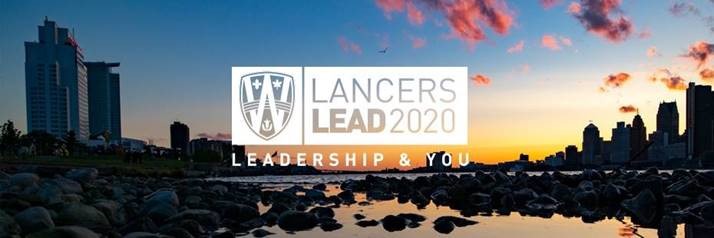
Registration is now open for the Lancer Leadership Conference, Saturday, Feb. 1, at the SoCA Armouries.
With a theme of “Leadership and You,” the conference offers attendees two threads:
- leadership and self-care, and
- leadership and self-knowledge.
Leadership Hub co-ordinator Simon du Toit notes that this year’s roster features many more student speakers.
“We are excited to be able to offer such a strong line-up of presenters,” he says. “At only $20 for students to register, we know we’re offering a great value.”
Early registration is recommended, as places are limited; find the full schedule and registration details on the conference website.




Donors give hand-up to Student Leader
http://www.uwindsor.ca/dailynews/2019-12-20/donors-give-hand-student-leader
Richter: The Canada-U.S. dispute on NATO funding – It’s complicated
Canada is still a very long way off from reaching its NATO spending target of two per cent of GDP, and there are many reasons to suspect that it will not happen anytime soon, if ever.
Updated: December 12, 2019

This grab made from a video shows Dutch Prime Minister Mark Rutte (L), French President Emmanuel Macron (front), British Prime Minister Boris Johnson (R) and Canadian Prime Minister Justin Trudeau at a Buckingham Palace reception mocking US President Donald Trump's lengthy media appearances ahead of the NATO summit on December 3, 2019 in London.
The recent NATO summit threatened, briefly, to bring Canada-U.S. relations to a historic low, but it appears the worst was avoided. And yet, the fallout of President Donald Trump’s obvious frustration with Canada over defence spending, and Prime Minister Justin Trudeau’s unhappiness with the unpredictability of the mercurial U.S. leader, point to warning signs that cannot be easily forgotten.
On the issue of NATO and defence spending, as much as Canadians would prefer not to think about it, the president is largely correct; Canada is indeed “slightly delinquent,” although observers could be forgiven if they prefer to use a stronger adjective (“enormously” comes to mind). So, in the interest of accuracy, let’s review the numbers.
As recently as the 2014 NATO summit, Canada agreed to re-commit to the alliance spending target of two per cent of GDP, although the Canadian delegation (along with Germany’s) tried to water the commitment down. At the time, Canadian defence spending was a shade under one per cent of GDP, so getting to two was widely acknowledged to be an enormous challenge that required immediate action.
On the issue of NATO and defence spending, as much as Canadians would prefer not to think about it, the president is largely correct,
Over the course of the last seven years, defence spending has largely flatlined. Two additional points need to be made, however. The first is that defence spending in 2019 will come in at about 1.3 per cent of GDP, suggesting that some progress has been made. That, unfortunately, is not the case. A few years ago, the Canadian government announced changes in how defence spending was to be calculated (which would henceforth include expenses such as the Coast Guard and peacekeeping), and it is this accounting change that explains the seemingly impressive increase. Were it not for this modification, spending would still be around one per cent.
And as for the prime minister’s awkward response at his press conference with the president, at which, after being pressed by Trump on how much Canada specifically spends on defence, Trudeau said that “the number we talk about is [a] 70 per cent increase over these past few years” – well, that statement requires some unpacking. The 70 per cent figure comes from the government’s 2017 Defence White Paper, which did indeed promise a significant increase in defence spending over the next decade, up to an anticipated total of $32.7 billion in 2027 (up from about $18 billion in 2017).
But the reality is that the vast majority of the spending increases are to come in the later years of the plan, specifically years six to 10 (which corresponds to between 2023 and 2027). As a result, many observers are extremely skeptical that such increases will ever happen, for the simple reason that it is extraordinarily difficult to make spending promises so far in advance, not to mention the likelihood that by that time a different government may be in power with different spending priorities. Simply stated, if the government were truly committed to increasing defence spending, then it could have started such increases immediately.
The net result is that Canada is still a very long way off from reaching the NATO target, and there are many reasons to suspect that it will not happen anytime soon, if ever.
And as for the prime minister’s evident frustration with Trump, it is hard to even know where to begin. The relationship between the two leaders got off to a rocky start back when they first met in February 2017 – when it was clear that Trump’s attitude towards immigrants and asylum-seekers differed fundamentally from that of the prime minster – but it went off the rails in June 2018, when the president called Trudeau “dishonest and weak” after the prime minister said in a press conference that Canada “will not be pushed around” by the U.S. in trade negotiations.
The relationship then endured several months of very difficult NAFTA talks – which seemed on the verge of collapse several times – before the negotiations ended in a new trade agreement last November, with signoff in Mexico City this week. Things seemed to be returning to relative calm until the NATO meeting’s extraordinary developments, which ended with Trump calling Trudeau “two-faced” over the prime minister’s stumbling answer on defence spending, and Trudeau being caught on an open mic apparently making fun of the President’s penchant for holding press conferences that go on for as long as he feels like talking (a slight that at least benefits from being true).
All told, these are odd days for the Canada-U.S. relationship. The Liberal government has largely managed Trump’s temper and erratic nature quite well, and while there have been some missteps, they have generally been small and not particularly damaging. But the president is nothing if not unpredictable, and the pressure will stay on our federal government for the duration of his presidency, which could last for an additional five years. Trudeau had better have all hands on deck.
Andrew Richter is an Associate Professor of Political Science at the University of Windsor.

MA Candidate Jesse Antwi-Kusi was recently awarded the 2019-2020 University of Windsor Community Scholarship for African Students. The award is intended to advance knowledge and contribute to the educational, social, cultural, and economic development of the people of Africa. The Department of Political Science congratulates Jesse for his achievement.
OPIRG WINDSOR AND THE NATIVE STUDENT ALLIANCE PRESENT:
The President's Indigenous Peoples
Scholars Panel
Friday, March 8, 2019
12 pm - 1 pm - CAW Student Centre Commons


The Department of Political Science is pleased to sponsor:
The Return of Resource Nationalism in Southern Africa
This event will take place on Thursday, March 21, 2019
2:00 pm to 4:00 pm, Dillon Hall, Room 355
ALL ARE WELCOME!

The Health Research Centre for the Study of Violence against Women is pleased to present
"After #MeToo: Evaluating Canada's Strategy to Combat Violence against Women in Politics" with Dr. Tracey Raney
March 7, 2019, 11:30 am to 1 pm, Toldo, Room 203
Light Refreshments will be provided
ALL ARE WELCOME

Guest Lecture by Senator Donna Dasko
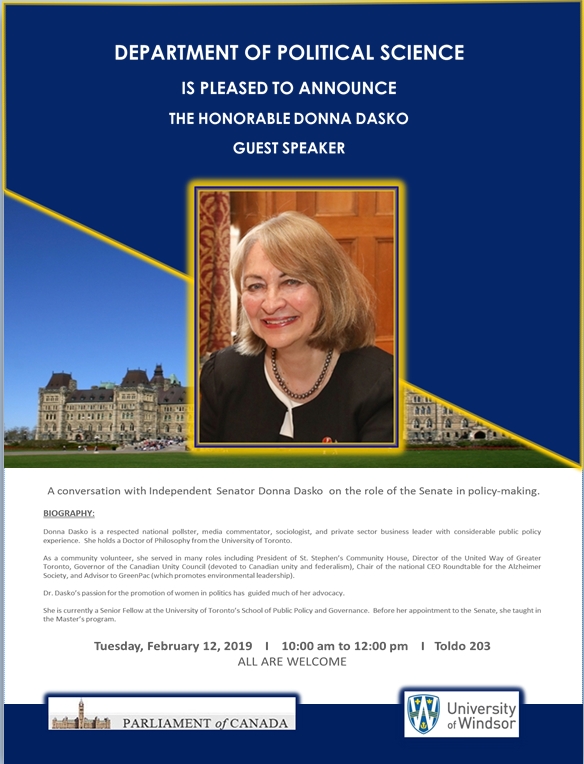
Biography
Donna Dasko is a respected national pollster, media commentator, sociologist, and private sector business leader with considerable public policy experience. She holds a Doctor of Philosophy from the University of Toronto.
As a community volunteer, she served in many roles including President of St. Stephen’s Community House, Director of the United Way of Greater Toronto, Governor of the Canadian Unity Council (devoted to Canadian unity and federalism), Chair of the national CEO Roundtable for the Alzheimer Society, and Advisor to GreenPac (which promotes environmental leadership).
Dr. Dasko’s passion for the promotion of women in politics has guided much of her advocacy.
She is currently a Senior Fellow at the University of Toronto’s School of Public Policy and Governance. Before her appointment to the Senate, she taught in the Master’s program.
Film about Windsor feminist activist Pat Noonan (October 3, 2018)
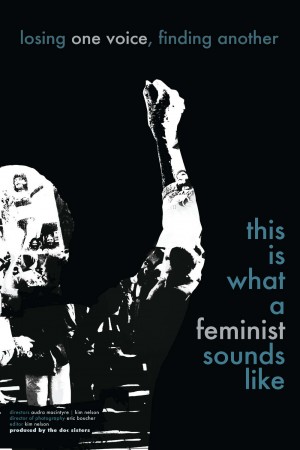
“Unless someone like you cares a whole awful lot, nothing is going to get better. It’s not.” Dr. Seuss, “The Lorax” Pat Noonan–Rebel, Nun, Ex-Nun, Activist, Feminist, Environmentalist, Pacifist, Born and raised in Windsor, Ontario–died on August 11, at the age of 87, leaving a marvelous legacy of friends and political contributions in our community. "This is What a Feminist Sounds Like" chronicles the many lives of the charismatic, passionate, tireless advocate, Pat Noonan. Pat Noonan grew up in the city of Windsor. She got her start fighting inequality and defending the victims of cruelty, prejudice, and indifference in grade school. Inspired by the social justice aims introduced at her Catholic high school to Observe-Judge-Act, Pat became a nun for 23 years. A tireless and active crusader for women, the environment, peace, harm reduction, workers, and her hometown, Pat Noonan’s compassion, talent, and energy were boundless. She was a brilliant, path-breaking, and fearless advocate. Forged-in-Windsor, Pat affected so many in this city and beyond with her immense love, humanity, and energy. Pat Noonan is an example of how a life can be lived fully and with a fierce and deep commitment to the rights of others; this is her story.
We celebrate Patsy Noonan's life by screening the 2013 film, "This is What a Feminist Sounds Like," in which Windsor film makers Kim Nelson and Audra Macintyre exquisitely captured her story. Wednesday, Oct. 3, 2018, at 7:00 pm at the Capitol Theatre.
To benefit women film students: To honour Patsy, we're asking for a $10 donation or pay-what-you-can to help establish a bursary for women in film at the University of Windsor. We're looking forward to an evening of stories/reminiscing about our extraordinary and (in)famous friend. Hope to see you then!
Dr. Radoslav Dimitrov speaks on "The Paris Agreement on Climate Change" (October 1, 2018)
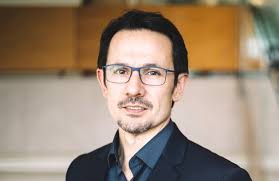
The 2018-2019 Distinguished Speakers Series on Global Environmental Governance is pleased to host Dr. Radoslav Dimitroc who is Associate Professor at the University of Western Ontaio and European Union Delegate to the UN Climate Change Negotiations. His guest lecture on the Paris Agreement and climste change will take place in room 203 of the Toldo Building at 10:00 AM on October 1st, 2018. This series is sponsored by the Department of Political Science and the Great Lakes Institute for Environmental Research. All are welcome.
Dr. Cheryl Collier's edited volume The Politics of Ontario is nominated for the Ontario Speaker’s Book Award (March 20, 2018)
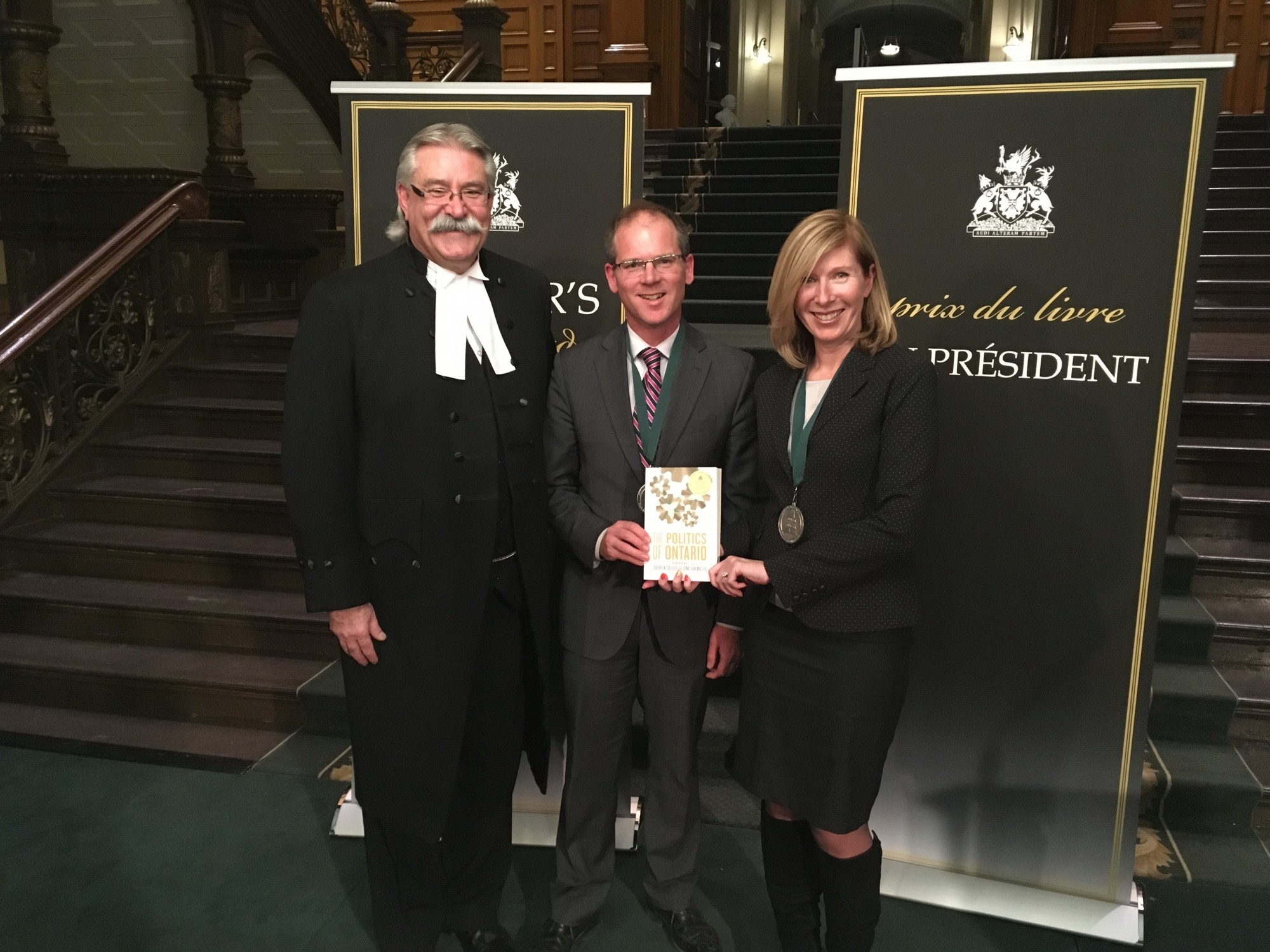
The Politics of Ontario, a volume edited by Dr. Cheryl Collier and Dr. Jonathan Malloy from Carleton University, was nominated for Legislative Assembly of Ontario Speaker’s Book Award. This award “recognizes works by Ontario authors reflecting the diverse culture and rich history of the province and of its residents.”
Ontario is the most populous of Canada's provinces, contains the country's largest city, and continues to be the centre of finance, IT, and media. It is also experiencing significant changes and upheavals. The Politics of Ontario is the first comprehensive book on Ontario's politics, government, and public policy since Graham White's The Government and Politics of Ontario in 1997. Although The Politics of Ontario follows in the same tradition, it departs in several ways. While not losing sight of the enduring themes of Ontario politics and political culture, it reflects the fact that Ontario is no longer Canada's primary economic engine. Instead of emphasizing the continuity and gradual evolution of Ontario politics, it focuses on change, disruption, and the uncertainty of the political and policy environment through explorations of fiscal and economic policy, the environment, labour, multiculturalism, and the complexities of urbanization, with particular attention given to greater Toronto. The book is divided into four parts: Settings, Institutions, Politics, and Policy. It contains 28 charts, tables, and graphs, and features contributions by virtually all of the leading scholars in the field, including an introductory chapter by Graham White.
Master’s students honoured for their scholarly achievements (March 16, 2018)

First year Master’s degree students Alanna Foulon and Kamaldeep Mann both receive the A.R. & E.G. Ferriss Award valued at $1000 and the Stephen & Vicki Adams Scholarship in Graduate Studies valued at $500. The Department of Political science congratulates them for their scholarly achievements!
Dr. Ovadia Receives SSHRC Connection Grant (2017)
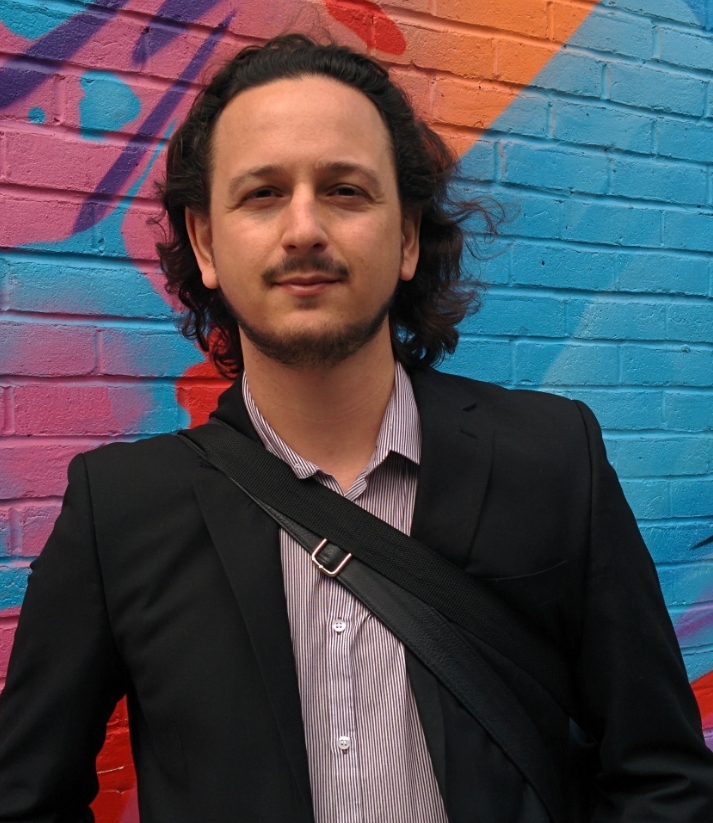
Dr. Ovadia’s SSHRC Connection Grant will be used for a workshop called “Mobilizing Canadian Knowledge on Natural Resource-Based Development in Africa” and follow-up knowledge sharing activities. Dr. Ovadia is the Principal Investigator for the project, which also includes two Co-Investigators, Dr. J. Andrew Grant and Dr. Nathan Andrews, both from Queen’s University. This workshop will take place at the University of Windsor on September 8, 2017. It will include contributions from four senior scholars, 25 academics non-academic practitioners from Engineers Without Borders and the Diamond Development Initiative. More information to follow.
Dr. Cheryl Collier and Dr. Jonathan Malloy Launch The Politics of Ontario (2017)
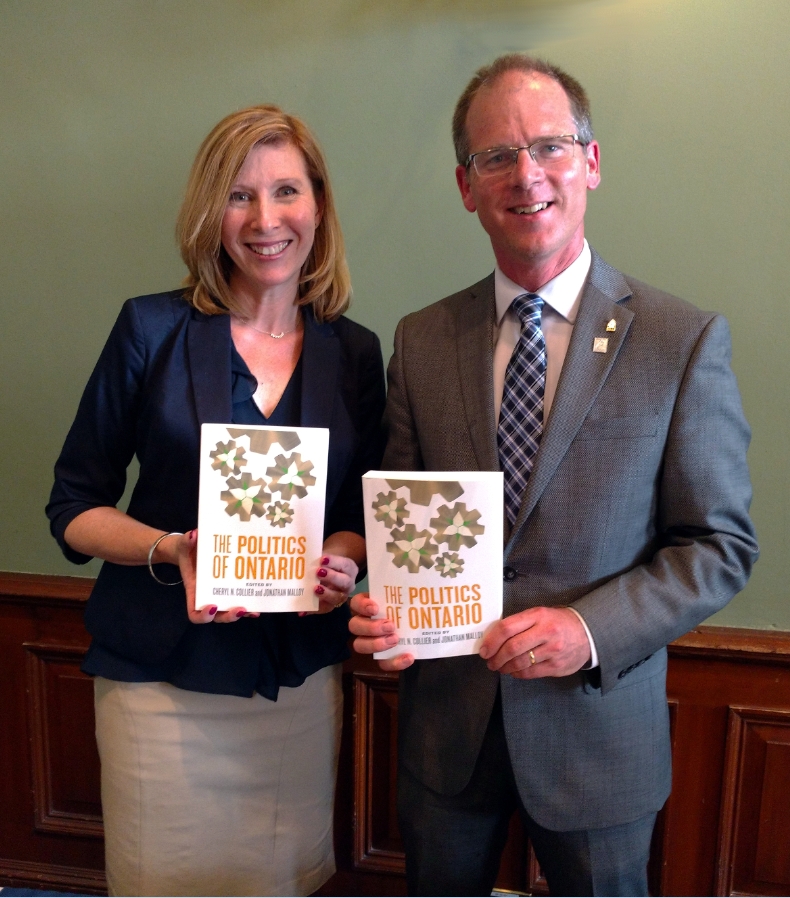
Dr. Cheryl Collier and Dr. Jonathan Malloy attend the official book launch of their new edited book "The Politics of Ontario", University of Toronto Press, which launched at Queen's Park in Toronto on May 17, 2017.
Wide Range of Enthusiasms Earns Notice for Graduand (2017)
Logan Carmichael
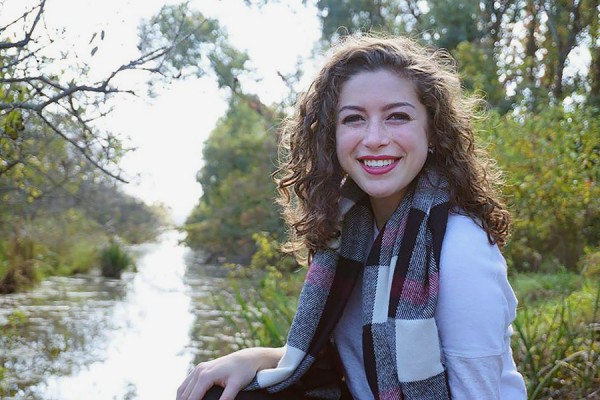
Logan Carmichael’s record of community service, campus engagement and academic achievement have earned her the 2017 President’s Medal.
Working on a research project with professor Jamey Essex inspired Logan Carmichael to set a new course for her career. As she prepares for her graduation from the University of Windsor, the political science major plans to pursue a life in diplomacy.
Carmichael will collect the 2017 President’s Medal during Friday’s 10 a.m. session of Convocation. The award recognizes a graduand who has made significant contributions to campus and community activities while maintaining a superior academic record.
Carmichael coupled classroom success — culminating in this year’s Board of Governors medal for top standing among graduates of political science — with achievement across a number of fields.
A middle-distance runner for the Lancer track program, she was named an academic all-Canadian in 2014 and 2015. She has worked with the Annual Giving Program phonathon throughout her UWindsor career, and mentored several first-year students through the Connecting4Success program.
Her philanthropic activities include planning benefit dinners to sponsor refugee families through Project Syria, and founding the charity Knit One, Purl One, Give One, which donates knitted goods to the needy.
“Over two years, we have donated well over 100 pieces — mittens, hats, and scarves,” Carmichael says. “I am so excited that we have people committed to taking it over for next year.”
An additional project that she describes as “a work in progress” is Another Mile Sneakers, which seeks to pass on gently-used athletic footwear to aspiring athletes in needy countries.
“As a Lancer runner, I could go through a pair of shoes every two months,” she says.
Still, she describes her experience with Dr. Essex as the best of her time at UWindsor. An academic appointment as an Outstanding Scholar grew into a term as a research assistant on a project exploring the 2013 creation of Foreign Affairs, Trade and Development Canada.
Seeing the resulting paper published in the Canadian Geographer was “very exciting,” says Carmichael, and nurtured her enthusiasm for Canada’s foreign service.
She is currently waiting to learn whether she will receive a scholarship to pursue graduate study at the Russian International Olympic University in Sochi, allowing her to combine her interests in sports, diplomacy and Eastern Europe.
Whatever the future holds, she will continue to rely on her primary support system: her family.
“My mom and my brother — they are in my corner no matter what!” Carmichael says.
Don Meredith Should Have Quit a Long Time Ago (2017)
Tiffany Gooch is a political strategist at public affairs firms Enterprise and Ensight, secretary of the Ontario Liberal Party Executive Council, and an advocate for increased cultural and gender diversity in Canadian politics.
In February, the Black Business and Professional Association (BBPA) invited me to host its Black History Month event in Toronto, awarding political leaders from the black community.
I was honoured. I am a fifth-generation black Canadian from Windsor – the descendent of a resilient people who sought their freedom through the Underground Railroad, settling and building vibrant communities in southwestern Ontario.
As an artist and a political strategist now living in Toronto, this event was a combination of my favourite things: the celebration of black excellence and a recounting of progress, with a call to action for increased co-ordination and political power within our community.
Related: Disgraced Senator Don Meredith to resign
I was ecstatic to have an opportunity to encourage more black Canadians to join our growing political movement. My heart sank when I learned that one of the award recipients for the BBPA event was Don Meredith.
A week before the event, I worked alongside black leaders from across Canada to hold a lobbying day on Parliament Hill. We met with more than 60 members of Parliament and talked about everything – policing, border security, corrections, economic development, education, health equity, immigration and diversity in public appointments.
We discussed the exposure of anti-black racism in the United States in recent events. We explained that our Canadian institutions and communities are not immune. We applauded the Liberal government’s commitment to multiculturalism, Indigenous reconciliation, refugees and women’s issues, and noted that general diversity and inclusion policies are, at times, inadequate in addressing the unique challenges faced by African-Canadians.
Defence of Don Meredith on the basis of race is a disservice to the tireless work being carried out by Canadians across the country combatting anti-black racism. His actions were indefensible. His is not an issue of race.
With his family present and hundreds in the live audience, I struggled to follow my script. I remembered my grandmother’s advice: If I didn’t have anything nice to say I shouldn’t say anything at all. Unable to carry out my function in good conscience, I sat down and asked the president of the BBPA to take over the program and returned to the stage after the awards were distributed.
There are thousands of remarkable black Canadians – women and men – who would excel at carrying out the functions of a senator without abusing their power. Prime Minister Justin Trudeau has an embarrassment of options to ensure black Canadians are represented in future Senate appointments.
Just after the BBPA event, I moderated a panel at the Equal Voice ‘Daughters of the Vote’ conference in Ottawa. The topic of our panel was “Finding Courage”. We laughed, we cried, and we shared stories carrying out constructive dialogue about the barriers facing young women in politics and how to overcome them. Sexual harassment, sexual assault, and a culture that protects powerful men over girls became prevalent in our discussions over the course of the week.
It is difficult enough for young women – and young women of colour in particular – to enter and navigate political spaces. The future of our country depends on our ability to cultivate a culture of safety and inclusion for young women entering and navigating the Canadian political arena.
Protecting girls (and black girls in particular) seeking to bring their talents to politics greatly outweighs the need to protect black men in leadership who prove themselves unfit.
Don Meredith needed to resign. He should have resigned a long time ago.
It’s not enough just to believe it. It’s not enough just to tweet about it.
I hope Canadians will take up our collective responsibility to our children. We need to roll up our sleeves and do the difficult work necessary to eradicate this kind of behaviour (and the culture that perpetuates it) within our political institutions.
Chilean Experience Enhances University Education for International Relations Student (2017)
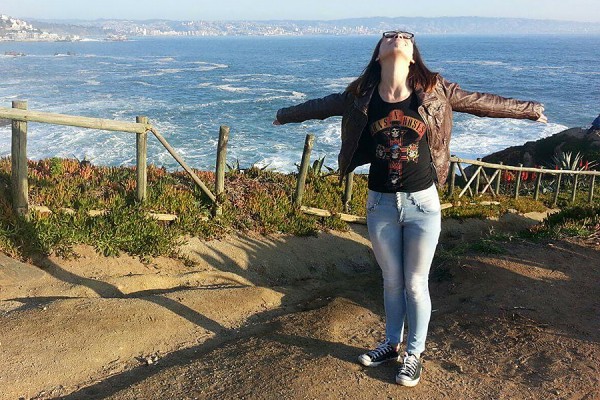
Arianne Rodriguez Saltron revels in her experience while on exchange in Chile.
The support she received both in preparing for her exchange and once she arrived in Chile made for a smooth experience, says Arianne Rodriguez Saltron. A student of international relations with a minor in Spanish, she spent a semester at the Universidad de Santiago de Chile, and calls it the best decision she ever made.
“Living in Chile definitely improved my Spanish fluency,” she says. “And the campus is in the heart of (the Chilean capital) Santiago, so there are always cultural events happening, many museums to visit and so many cool neighborhoods to discover.”
Rodriguez Saltron says she felt well-supported both by the UWindsor exchange office and her Chilean hosts.
“The exchange staff at both universities are helpful and attentive, making sure that you are not thrown in the dark and answering any questions you may have along the way,” she says.
Faculty were accommodating and her courses in history and comparative politics gave her a broader perspective on world affairs. She even had opportunities to travel through the region.
In short, says Rodriguez Saltron: “Living in Chile was amazing!”
The University of Windsor has joined the Canadian Bureau for International Education’s (CBIE) Learning Beyond Borders initiative to get more Canadian students to take advantage of learning experiences in other countries. Despite reports from the students on the transformational nature of the experience, only about 3 per cent of Canadian undergraduate university students opt for international exchange.
“Arianne’s experience reflects that of most our students who go on exchange,” says Ryan Flannagan, associate vice-president, student experience. “Spending time abroad contributes to their academic and career achievements and enhances their communication skills, self-awareness and adaptability.”
He says the University aims to increase exchange participation in its students by 30 per cent over the next two years.
Find more information on the national campaign to inspire learning abroad on the CBIE website.

